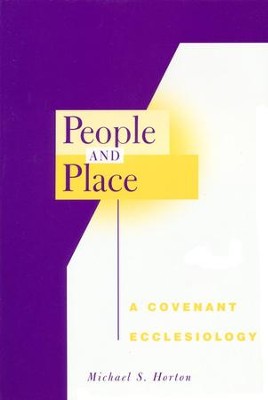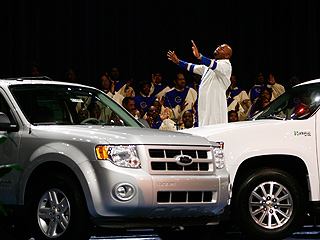If I Had to Pick a "Book of the Year" This Would Be It
 Monday, December 15, 2008 at 02:19PM
Monday, December 15, 2008 at 02:19PM  Someone at church asked me this question. "What was the best new book released this year?"
Someone at church asked me this question. "What was the best new book released this year?"
This was a very tough question. No doubt, Scott Clark's Recovering the Reformed Confession (P & R) is a very important "must read" book, as is Mike Horton's other new book, Christless Christianity (Baker).
But Mike Horton's People and Place (Westminster John Knox) was one of those books that repeatedly grabbed my attention, and at a number of points gave me considerable pause when Horton raised very profound yet basic issues that I had never really considered, and yet should have. Until now ecclesiology was not a subject of much interest to me. That has changed.
The fourth and final volume in Horton's effort to set forth classical Reformed covenant theology as a foundation upon which Reformed theology can be renewed in our own age, this volume is perhaps the best in the whole series. It is certainly the most readable, and it touches upon many issues discussed on the White Horse Inn as well as in those Reformed/Presbyterian churches grounded in word/sacrament ministry.
I won't attempt a book review here--you must read it for yourself. But let me touch upon several of the book's major themes so as to pique your interest.
First, Horton starts with the premise that Christ's ascension brings about a major turning point in the redemptive drama at exactly that moment we'd least expect that turning point to occur. To our amazement, the suffering servant has become the exalted Lord in the resurrection. But then suddenly and unexpectedly, the exalted one disappears!
Our Lord's ascension therefore creates a rather surprising and important paradox in redemptive history which must be answered ecclesially. As Horton puts it, "precisely in that place vacated by the one who ascended, a church emerges." While some of us may find that ecclesiology doesn't turn our crank like debates over justification and election might do, Horton reminds us of the vital importance of this topic, both in terms of the mission of the church (necessarily tied to its apostolicity and its marks), as well as the piety and practice of the individual Christian, who is necessarily a member of that church.
Throughout the various chapters of People and Place, Horton makes an impressive case that Christ's final commands to his people define the mission and purpose of the church (i.e., the Great Commission, the institution of the Lord's Supper, the discourse of John 14-16). This connects Christ's promises to his disciples about what is to come, with one of the major themes of New Testament theology, namely Pentecost and the work of the Holy Spirit in and through those means given by Christ to his church--word and sacrament. Our ascended Lord is present with us, but in a particular way.
Second, Horton's discussion of the major ecclesiologies through the lens of Christ's ascension and Pentecost is very helpful. Is the essence of the church to be found in its institutions (Rome), or is the church an eschatological event (Barth)? The Roman church, for example, seeks to deal with Christ's absence through the papacy (as a sort of substitute for Christ on the earth), or through the institutional church (somehow a part of Christ's incarnation), or then later through the mystery of the Eucharist (Christ's visible presence).
Likewise, Pentecostals deal with the paradox of Christ's absence through the immediate operations of the Holy Spirit, understood apart from divinely prescribed means (such as word and sacrament), and to be sought in and through the experience of the Spirit in the human heart. No doubt, this paradox also explains why so many contemporary evangelicals have such a low ecclesiology--Christ's presence is understood in primarily subjective ways of apprehension, i.e., through "a personal" relationship/encounter with Jesus, quite apart from means such as word and sacrament, which are actually seen as impediments to the subjective and/or personal relationship.
And While Horton doesn't deal with this directly, the paradox of Christ's absence would certainly explain the dispensationalist's desire to push Christ's physical presence with his people off into the future--i.e., in an earthly millennium, where Christ will once again physically dwell in the midst of his people, fulfilling what was promised.
Third, all of Horton's main points are grounded in solid exegesis and a well thought-out biblical theology, all the while interacting with Roman, Orthodox, and Free Church traditions. This is especially helpful as Horton sets forth the Reformed (and biblical) alternative--a church which is apostolic, has its mission grounded in the marks of a true church as given by Christ, and is tied to God's covenant promises, which remain essentially the same throughout redemptive history. All the while, Horton sets forth the already-not yet tension (characteristic of New Testament eschatology), in which Christ's promises are realized to his people in the present, yet in anticipation of the final consummation.
Once you've finished this book, you'll never feel the same about the importance of the preached word, the sacraments, and the church (as the covenant community) to which these wonderful gifts have been given. This book should also help you understand the Reformed stress upon the preached word and the sacraments as "means of grace."
You can find People and Place here: Click here: Amazon.com: People and Place: A Covenant Ecclesiology: Michael S. Horton: Books











